Call for Collaborators
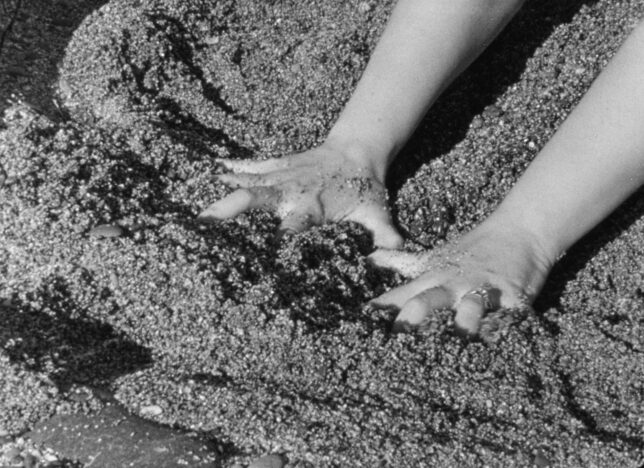
Artists Emily Beaney and Ana García Jácome are seeking expressions of interest from disabled women with a creative practice to contribute to an online collaborative project.
The project aims to facilitate exchanges of experience and creative practice between disabled women in Scotland and Mexico. Collaborators will be invited to contribute to three online discussions exploring issues of representation in society, culminating in a creative response which will inform the development of a short experimental film.
Download PDF version of this Call for Collaborators
Fee: £750
Collaborations will take place between September – November 2023.
Deadline for applications: Monday 7th August, 12 noon.
Eligibility
This open call is open to those who:
- Self-identify as disabled (this includes, but is not limited to, those who define as being disabled, d/Deaf, neurodivergent, experiencing chronic illness, health-related access requirements and more).
- Are based in Scotland.
- Are women, including Trans and Intersex women, non-binary and gender fluid people.
- Have a creative practice (this may include, but is not limited to, visual arts, combined arts, sound, writing, dance, performance, etc.)
Wider Project Description
Moving the Image / Moviendo la Imagen: Representing, Reframing and Reclaiming is a project developed by artists Emily Beaney (Scotland) and Ana Garciá Jácome (Mexico). The project aims to disrupt medicalised accounts of disabled women’s lives, using experimental and archival moving image practice to reclaim agency in representation.
The collective moving-image work will be shaped by an online collaboration between creatives in Scotland and Mexico (this element will involve the artists chosen via this open call), a workshop with disabled community members in Mexico City, and a three-week studio residency. Ana and Emily will seek to synthesise community and collaborator contributions to the project with re-worked archival footage, to produce a collective work that embodies disabled women’s experiences from a range of perspectives. The project will then conclude with public screenings and discussion events in Mexico City and the UK, including a screening at Glasgow Women’s Library.
Collaborator Role
We are seeking expressions of interest from disabled women with a creative practice to contribute to the development of Moving the Image through online discussions and creative responses. The online discussions will be held with Emily, Ana and three members of the ‘Femidiscas’ feminist disability collective in Mexico. These gatherings will seek to give voice to contemporary issues of representation in society. Collaborators will then be invited to respond to themes explored within the discussions through their creative practice. Emily and Ana will subsequently incorporate collaborators’ creative contributions to the project into a collective moving-image work.
Emerging from these exchanges of experience and creative practice between Scotland and Mexico, it is hoped that a sister feminist disability network in Scotland will be initiated that can continue to be in dialogue with the Femidiscas. Collaborators will be welcomed to join in the shaping of this network.
The Fee
Each collaborator will receive a fee of £750.
This is intended to cover:
– 3 x online discussion events (2 hours each with break)
– 1 x creative response (approx. 8 hours of collaborator’s time)
These fees are based on the Scottish Artist Union rates of pay: https://www.artistsunion.scot/rates_of_pay
Access support
Funding is available to support the access needs of collaborators (this may include, but is not limited to, BSL interpreters, captioners, support towards the cost of carers, support workers, childcare). We would be happy to accept access documents from collaborating artists – for more information about access documents and guides for writing your own see https://www.accessdocsforartists.com/.
Please get in touch if you need any access support in completing or submitting your application.
How to send an Expression of Interest
Please send a short statement expressing your interest in the project, along with a CV and any links / examples of previous creative work, to emily.beaney@gmail.com.
If you would prefer to apply using a different format, e.g. a video or audio recording, please email your files to emily.beaney@gmail.com.
Expressions of interest will be reviewed by Emily, Ana and Glasgow Women’s Library. Collaborators will be selected based on previous experience and engagement with the themes.
If you have any further questions on applying or would like this information in an alternative format, please email Emily Beaney on emily.beaney@gmail.com.
Further Information:
The Artists
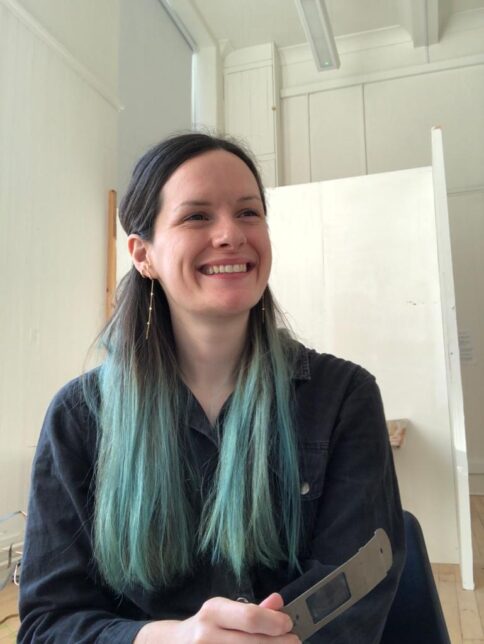
Emily Beaney is an artist, filmmaker and AHRC PhD researcher at Edinburgh College of Art, University of Edinburgh. Her practice-based research centres on themes of care, control and health inequalities. Working collaboratively with family, friends and community groups to explore lived experiences of embodied difference, illness and disability, her projects seek to communicate with, through and between bodies to reveal that which remains hidden / unheard. Emily has shared projects across the UK and internationally in festivals, conferences and with organisations including the Southbank Centre, Alchemy Film and Arts, the Royal Scottish Academy, Creative Scotland, British Council and Unlimited.
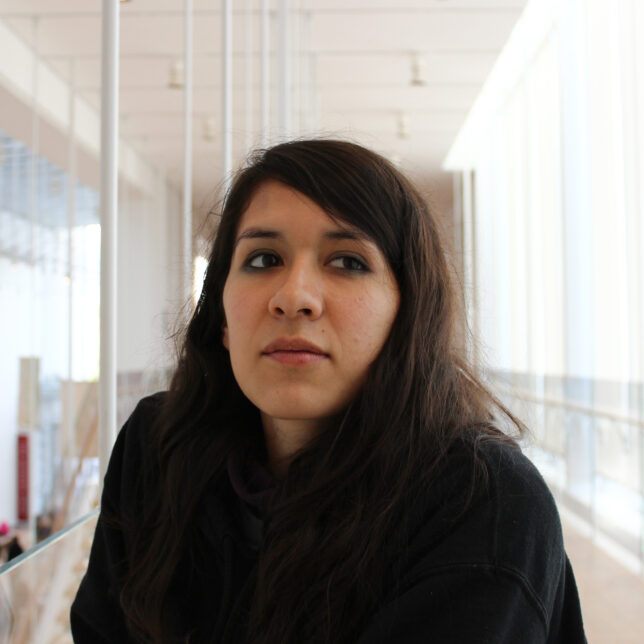
Ana García Jácome is a Mexican visual artist that works with different media such as drawing, writing, and video. Her practice addresses the social construction of disability and looks for ways to re-articulate its narratives. Her work has been presented in different exhibitions, festivals and screenings in Mexico, USA, UK and New Zealand. Since 2020 she is a member of Mexican feminist crip collective Femidiscas.
Femidiscas is a collective of diverse women: disabled, sick, mad, neurodivergent women that identify as feminists and embody disability. One of our goals is to make visible the inequalities in daily life and in the feminist movement that we face as disabled women, and to find counter-ableist ways to respond to them. Each member of Femidiscas has a different academic background, so we have an interdisciplinary dialogue between the social sciences, humanities and arts. Our actions focus on the collective care that comes from accompanying and listening to each other; education and consulting around topics that affect us as disabled women and the creation and dissemination of contents in different accessible formats about feminism and disability.
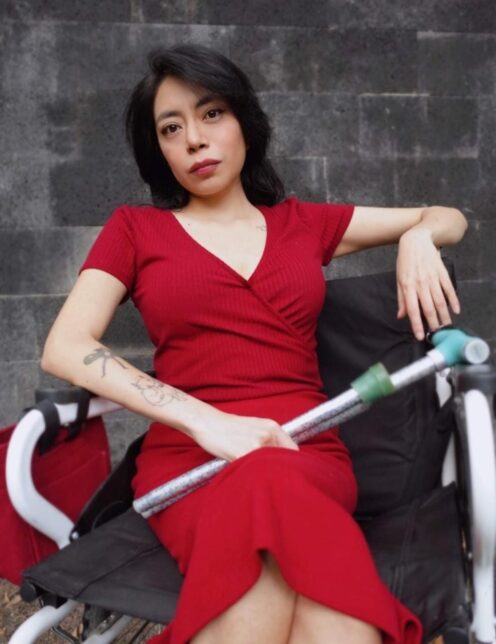
Daniela Herrera is a sick and disabled woman. She is a cyber-activist, counter-patriarchal, communications mayor and social researcher. She is a member of the National Network of Feminists with Disability “Femidiscas” and a member of the world wide organization Millions Missing in Mexico. She works with topics related to disability, the sick body, gender and medical violence, and virtual communities of chronically ill women.
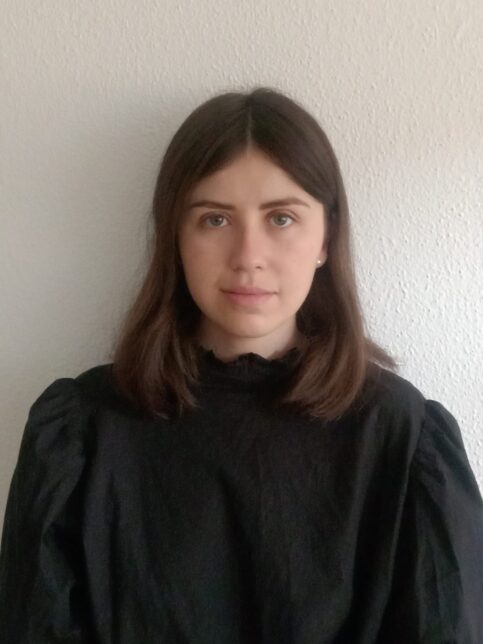
Nur Matta
Nur Matta studied a BA in Plastic Arts at the University of Arts Unarte in Puebla, Mexico, and has organized different cultural events about disability. She has participated in round tables at Museo Amparo, BUAP, the Secretariat of Culture of Puebla and Piso 16, and has been grantee of the Inclusive Culture and PECDA programs of the Secretariat of Culture of Puebla. Some collective exhibitions where her work has been shown are: Para no convertir a nadie en un espejo, Horror, Ciudad de México (2022); Working tongues, 12-14 Contemporary Vienna (2022); Gimnasio de la lengua, La Verdi, Ciudad de México (2021). She is currently pursuing a masters degree in artistic research, and is a member of Femidiscas collective.
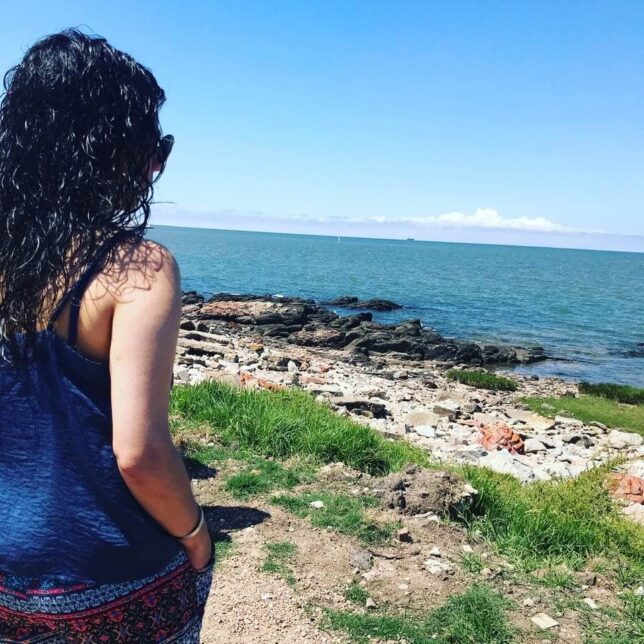
I currently live in Michoacán, México. For several years I lived with low vision and then I moved into blindness. In addition to living with a visual disability I live with chronic pain because of an illness. Through my experience with these things, I became interested in themes of disability, counter-ableism, illness and feminism from a non hegemonic perspective. I studied social sciences and philosophy. Sometimes I am a professor, sometimes I facilitate workshops, other times I write or do independent research about topics that interest me. I especially like to build collectively with other crip companions.
Funders and Partners
This project is funded by the Unlimited and British Council International Partner Awards. Further information about the commissions can be found here: https://weareunlimited.org.uk/blog/here-are-the-recipients-of-our-uk-international-partner-awards-2022-23/
Partnering on the project are Glasgow Women’s Library and Wellcome Collection.

Comments are closed.